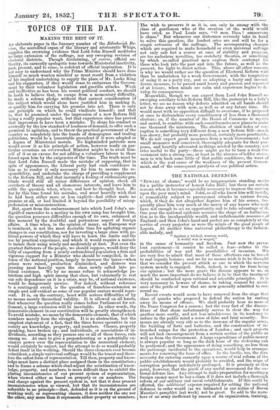THE NATIONAL DEFENCES.
"BEWARE of shams," would be no inappropriate standing motto for a public instructor of honest John Bull ; but there are certain seasons when it becomes especially necessary to impress the caution upon the poor man's mind. John, as all who know him will testify, is remarkably subject to paroxysmal attacks in various forms, which, if they do not altogether deprive him of his senses, fre- quently place him very much at the mercy of any knave who may have wit enough to see an opportunity and to take advantage of it. One year the national epidemic assumes the shape of an hallucina- tion as to the inexhaustible wealth and unfathomable resources of England; and then John's hand and pocket are as completely at the service of every projector as were the minds of the good people of Laputa. At another time universal philanthropy is the fashion- able malady, and
"Against a wicked, wanton world, A woful war is waged,"
in the cause of humanity and freedom. Just now the preva- lent excitement—it cannot be called a fear—relates to the probabilities of war and the possibilities of invasion. We are very free to admit that most of these affections can be traced to real organic lesions ; and we by no means wish it to be thought that we consider the present attack as one in which tho nervous system merely is engaged. Such, indeed, is very far from being our opinion ; but the more grave the disease appears to us, so much the more important do we believe it to be that the treatment should be conducted upon rational and scientific principles. It is very necessary to beware of shams, in taking counsel for avoid- ance of the perils of war that are now generally admitted to sur- round us.
Recent events would seem to have removed from the stage that class of quacks who proposed to defend the nation by casting away its means of offence. We shall probably hear no more of the Peace Congress for a season ; but the very fact of the discom- fiture of that sham unfortunately serves to clear the way for another more costly, and not less mischievous in its tendency to induce in the public mind a sense of false and fatal security. Ru- mours are already very rife as to the increase of the regular army, the building of forts and batteries, and the construction of in- trenched camps for the protection of London ; and such projects will not lack encouragement from a certain section of the public as well as from the Government. A large expenditure of public money is always popular so long as the dark hour of the reckoning can be postponed; and the appearance of doing something, no less than the patronage incidental to the operations, would help in arrange- ments for renewing the lease of office. In the bustle, too, the dire necessity for entering earnestly upon a course of real reform of the public establishments would probably be avoided, and the reign of corruption perhaps indefinitely prolonged. It is precisely at this point, however, that the pinch of any useful movement for the na- tional defence lies. Any attempt to make preparation for meeting a foreign enemy must be but a sham if it does not include a thorough reform of our military and naval establishments. If this could be effected, the additional expense required for setting the national defences in order would (as we intimated in our notice of Baron Maurice's pamphlet last week) not be great. To add to the num- bers of an army inefficient by reason of its organization, training,
habits, and equipment, would be bat to increase a burden. To build forts before we render our artillery efficient for its present duties, would be a wasteful and ridiculous expense. To fit out and man more ships, with existing arrangements for provisioning them unchanged, would be but to give to the enemy the advantage of the chances of pestilence and famine in addition to those of battle. Above all, these shams would divert the public attention from the necessity for resuscitating the spirit of the nation, and taking mea- sures to restore in the masses of the people that vigour of body and mind, the acknowledged presence of which is the cheapest, the safest, and the only effectual national defence. "Better a castle of bones than a castle of stones," is an apothegm as pregnant with wisdom now, in the case of the whole British nation, as it was within the narrow territory of the Anglo-Irish chieftain from whose lips it fell.



























 Previous page
Previous page